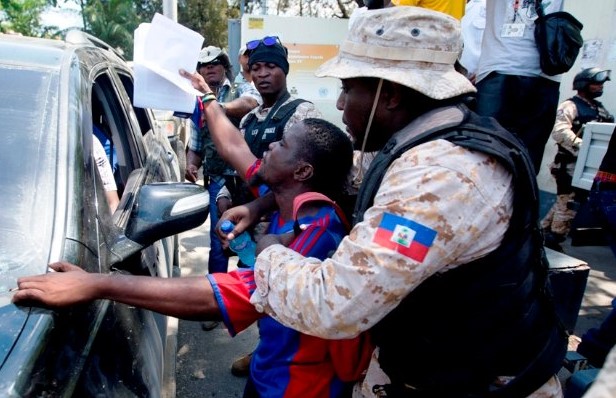AP photo
By
Ricardo Swire
An official report from the Republic of Haiti’s National Police (HNP) Deputy Commissioner informed that on Monday March 20, 2017 at approximately 2:00pm rocks were thrown and gunshots fired at the ex-President Jean-Bertrand Aristide‘s motorcade, as it approached a downtown Port-au-Prince intersection.
The car was officially escorted by two HNP Motorized Intervention Brigade vehicles, the domestically known “Slum Priest” and Fanmi Lavalas political party member unhurt.
Haiti’s internal security breach occurred after the country’s 1990 first democratically elected leader Aristide provided testimony in a former HNP Chief’s money laundering trial. Previously the ex-Haitian President fled to Venezuela after a military coup. The Roman Catholic Priest returned four year later following America’s intervention in Haiti’s internal security dilemma.
Reports inform that in the latest shooting incident blood splattered on the right front bumper and headlights of the ex-President’s vehicle. One Security Officer nursed a gunshot wound to his wrist and another unidentified victim was transported to the University Medical Center. Segments of a mobile phone video, broadcasted on social media, highlighted several rocks and repeat gunfire directed at the ex-President’s escorting HNP vehicles. An Inspector stated two uniformed HNP officers returned fire, their shots aimed at the opposite side of the intersection.
Over the years Caribbean security observers have regarded HNP and its leadership as taboo subjects. In 1991 a former HNP head was the mastermind behind Haiti’s insurrection that removed the country’s first democratically elected President. American Drug Enforcement Administration (DEA) agents arrested and charged the same senior Haitian law enforcer. In 1994 he absconded to Honduras. DEA charges were conspiracy to smuggle thousands of kilos of cocaine to the USA representing the Medellin Cartel.
During the HNP top boss’ tenure he personally selected the Chief of Port-au-Prince Airport and key maritime port officials to establish control on drugs transiting Haiti. From 1987 to 1996 cocaine passed through Haiti to America via couriers, who traveled aboard select commercial aircraft and ships. Participating Miami International Airport staff were bribed to ensure drug mules and cocaine laden suitcases evaded Customs inspections. Consignments delivered to Fort Lauderdale, West Palm Beach, New York and Chicago. Pablo Escobar and the Ochoa Brothers were among a syndicate of Colombian drug barons who consolidated and opened the trafficking route to America through Haiti.
Between April 2001 and August 2003 the DEA monitored another former HNP top boss who protected Colombian cocaine consignments. A May 2004 DEA report described how the former HNP Chief received US$150,000 per plane load of cocaine, smuggled by a particular high-powered Colombian trafficker. The senior Haitian law enforcer routinely protected ten kilos or twenty-two pounds of cocaine thru Haiti destined for America. Additionally, he orchestrated private drug plane landings on Haiti’s Route 9 highway, comfortably accumulating US$1.8 million in personal assets, wealth that included real estate and two Palm County, Florida mansions.



No Comments Yet!
You can be first to comment this post!